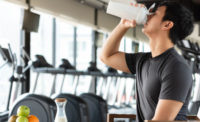Dairy delivers for seniors’ health needs
Protein plus added ingredients for mobility, blood-glucose control and immune support help seniors navigate the challenges of aging.

Photo courtesy of eggeeggjiew via www.gettyimages.com

Demand for healthy aging products is being driven by aging of the population. By 2050, 16% of the globe's population will be 65 or older, with that figure rising to 25% in Europe and North America. In Japan, 28% of the population is already over 65 years of age. Older consumers often prefer to obtain wellness benefits from dairy beverages and yogurts.
Maintaining mobility
The World Health Organization says mobility is a key component driving healthy aging success, and maintaining mobility is a core concern that seniors face.
“With 75% of global senior consumers (60-plus) saying mobility problems have a moderate or severe impact on their current health, there is a clear unresolved need for products formulated to address wider mobility concerns in the aging population,” says Victoria Lam, global manager, marketing, active living for Fonterra. “Mobility can be defined by five key interconnected healthy aging needs. They include: bone and joint health (osteoporosis prevention), muscle health and strength (sarcopenia prevention), balance and agility, flexibility, and energy.
“Up to 99% of the body’s calcium resides in bone,” she continues. “The body can’t make calcium; therefore, an adequate supply of calcium in the diet is required to avoid bone loss. Vitamin D is an important nutrient, as calcium absorption and phosphate reabsorption are supported by vitamin D.”
Dairy proteins such as milk protein concentrate and calcium caseinate can be “ideal ingredients,” Lam notes, as they are a source of both protein and minerals (calcium and phosphorus) needed to build and maintain bone.
Supporting muscle health
Topping the list of nutrients provided by nutrition beverages is protein, followed by more protein. Many brands’ “original” formulas contain 10 grams of protein (an excellent source).
Technologies to filter and concentrate dairy proteins allow manufacturers to deliver 20 grams and even 30 grams of high-quality protein per serving. Neutral-pH beverages typically utilize milk protein concentrates and isolate, while lower-pH beverages use whey proteins in a clear format with various fruit flavors.
Aging is often associated with a reduced appetite and a blunted ability to synthesize and retain muscle. While plant-based milk alternatives have made significant inroads in the dairy case, most manufacturers still use high-quality dairy proteins as the basis of their nutritional beverages for seniors.
Alfonso Cruz-Jentoft, M.D., Ph.D., past president of the European Geriatric Medicine Society, outlined some nutritional goals for muscle health, including a recommendation by the European Society of Clinical Nutrition and Metabolism for a daily protein intake of 1.2 to 1.5 grams/kilogram/day for adults with acute or chronic diseases or injuries. And in its March 2022 “Nutrition News,” Milk Specialties Global reported on several studies — one indicating that dairy consumption can reverse frailty in seniors and another reporting that higher breakfast protein quality was associated with a reduction in incident weakness in older adults, independent of protein intake.
Controlling blood glucose
The American Diabetes Association notes that the percentage of Americans age 65 and older with diabetes remains high, at 29.2%, or 15.9 million seniors (diagnosed and undiagnosed). In addition, a recent study suggests that 30% to 40% of all coronavirus deaths in the United States have occurred among people with diabetes.
Keys to lowering blood sugar response are lower-glycemic sugars, as well as added protein and fiber to slow digestion. Abbott developed a variety of CarbSteady nutritional supplement ingredient blends that are scientifically designed to help manage blood-glucose response. The line includes formulas specific to diabetics, dialysis patients, and renal conditions.
Immune support top of mind
The COVID-19 pandemic has made immune support top of mind for many seniors. Nestlé’s Boost Glucose Control Max protein drink includes vitamins C and D, zinc, iron, and selenium — key nutrients for immune support.
Many nutritional beverages serve as a meal replacement and often contain as many as 25 to 30 different vitamins and minerals. These beverages are typically gender-neutral, but dairy manufacturers might peruse the multivitamin aisle for insights into potential gender-specific claims. Centrum Silver for women touts heart, brain, eye, and bone health, whereas the Silver formulation for men focuses on heart, brain, eye, and muscle health. Nestle’s Boost for women includes iodine and selenium for thyroid function; calcium and vitamin D for bone health; and biotin and zinc for hair and skin health.
Aging is associated with a variety of health concerns for seniors, and targeting these issues presents some interesting opportunities for the dairy industry.
Looking for a reprint of this article?
From high-res PDFs to custom plaques, order your copy today!





